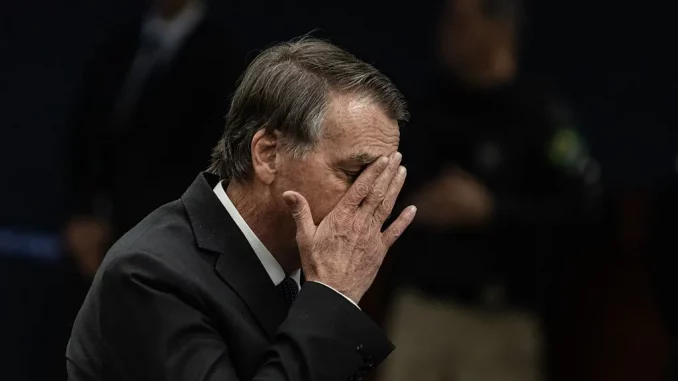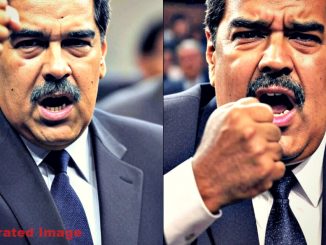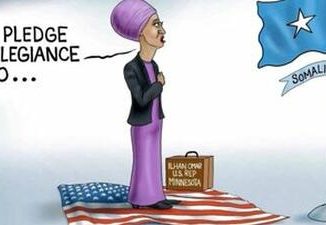
Former Brazilian president Jair Bolsonaro.
Published September 12, 2025
Brazil’s Bolsonaro Convicted for Coup Plot: A Landmark Ruling
The Case and the Verdict
-
On 11 September 2025, Brazil’s Supreme Federal Court (Supremo Tribunal Federal, STF) convicted former President Jair Bolsonaro of orchestrating a plot to remain in power after losing the 2022 presidential election.
-
He was found guilty on five counts:
-
Participating in an armed criminal organization
-
Attempting the violent abolition of democracy
-
Organizing a coup d’état
-
Damaging government property
-
Damaging protected cultural (or heritage) assets
-
-
The panel of five justices voted 4-1 to convict. One justice, Luiz Fux, dissented, raising questions about jurisdiction and whether the evidence justified such a sweeping judgment.
-
Sentencing: Bolsonaro was handed 27 years and 3 months in prison, under a regime initially closed.
What Evidence and Proceedings Led Here
-
Federal Police Investigation & Final Report
-
In November 2024, the Federal Police completed an investigation involving Bolsonaro and 36 other individuals, formally indicting them for crimes such as attempted coup d’état, participation in a criminal organization, and violent abolition of democratic rule.
-
The investigation concluded that Bolsonaro “planned, acted, and directly and effectively controlled the execution of acts carried out by the criminal organization aimed at implementing a coup d’état and abolishing the Democratic Rule of Law.”
-
A draft emergency decree was found, which, if enacted, would have allowed suspending election results or challenging them under pretexts of fraud. The report suggests Bolsonaro reviewed and edited this decree.
-
-
Operation Tempus Veritatis
-
This operation was launched by the Federal Police in February 2024.
-
It involved seizure of devices, communications, search-and-seizure warrants, and arrests of military officers and former ministers. One key item was a video (from a computer belonging to Mauro Cid, former aide to Bolsonaro) showing a meeting held on 5 July 2022, where Bolsonaro allegedly instructed ministers on preparatory measures ahead of elections, including discussing how to respond to potential unrest (“guerrilla”) and the threat posed by electoral institutions.
-
-
The “Draft Decree” & Emergency‐Decree Plans
-
The investigations uncovered a draft decree discussed among Bolsonaro’s inner circle that appeared designed to enable state of emergency powers. This decree allegedly would have given him authority to annul or delay election results.
-
Mauro Cid, who accepted a plea deal/cooperation agreement, testified that Bolsonaro “received and edited” the decree. Also, Cid alleged that cash to finance “special troops” was transferred via a wine crate by Walter Braga Netto, in connection with plots to kill political figures including President-elect Luiz Inácio Lula da Silva, Vice President Alckmin, and Supreme Court Justice Alexandre de Moraes.
-
-
Other Pieces of Evidence: Documents, Communications, Witness Testimonies
-
Communications and messages among military personnel and government officials: evidence from seized phones, documents, and intelligence operations.
-
Testimonies: Besides Mauro Cid, other defendants and witnesses have been called. Some corroborate that plans or discussions were held, some contest their scope or direct involvement.
-
-
January 8, 2023 Insurrection / Riots
-
The storming of government buildings by Bolsonaro’s supporters after his loss in the election is cited as one of the culminating acts linked to the plot. Investigators view it not as spontaneous, but as part of the broader conspiracy to delegitimize election results and pressure institutions.
-
Proceedings & Legal Steps
-
Indictments & Acceptance of Charges
-
After the Federal Police submitted their findings, the Office of the Prosecutor General (PGR) filed formal charges. The Supreme Federal Court (STF) First Panel unanimously accepted charges against Bolsonaro and several of his allies in March 2025.
-
Initial charges included: forming or participating in a criminal organization; attempting to abolish democratic rule; coup d’état; damage (qualified by violence or threat); and deterioration of heritage or protected property.
-
-
Defense Responses & Challenges
-
Defense lawyers argue that much of the evidence is circumstantial: that Bolsonaro did not issue the emergency decree; that planning is not the same as execution; that the draft decree was never enacted.
-
They also raise procedural objections: insufficient access to raw evidence, allegations of evidence cherry-picking by police; concerns over jurisdiction; and contestation of some testimony, especially by informants/cooperators like Mauro Cid.
-
-
Trial Before the STF First Panel
-
The trial (Ação Penal 2668, or Case AP-2668) is heard by a 5-judge panel (out of the 11 on the Supreme Court), presided over by Justice Alexandre de Moraes. Other justices on that panel include Flávio Dino, Luiz Fux, Cármen Lúcia, and Cristiano Zanin.
-
Defendants include Bolsonaro and his close aides and former military or intelligence officials: e.g. Walter Braga Netto, Anderson Torres, the director of the intelligence agency, advisors etc.
-
-
Testimony & Plea Deals
-
Mauro Cid struck a cooperation agreement with prosecutors; his statements and materials (devices, videos) are central to several findings.
-
Bolsonaro himself testified before the Court in June 2025, denying that there was ever any plan for a coup, arguing the allegations are politically motivated, and insisting he respected institutional transitions of power.
-
-
Judgment & Conviction
-
After weighing all the evidence, in September 2025, the panel voted 4-1 to convict Bolsonaro on five counts including coup d’état, leading an armed criminal organization, violent abolishment of democracy, damage of protected heritage, etc. The dissenting vote came from Justice Luiz Fux.
-
Sentencing followed: 27 years and 3 months in a closed regime for the combined counts.
-
Disputed / Weak Link Arguments & Defense’s Key Contentions
-
-
Jurisdiction & Legal Scope: The defense argued that the specific court panel did not have jurisdiction, or should not be trying a former president under certain counts.
-
Lack of Execution: One major defense point is that many of the asserted plans (e.g., the emergency decree) were never implemented. They claim planning alone does not always meet the legal threshold of attempted coup unless there is an overt act.
-
Reliability of Cooperators / Informants: In particular, questions were raised about whether informants like Mauro Cid could be trusted, whether they lied, or whether their pleas were obtained under pressure.
-
Access to Full Evidence: Defense complains that what they are shown is a version of assembled evidence, not necessarily full raw data, some with excerpts, which they say impedes their ability to test every claim.
-
 Implications of Bolsonaro’s Coup-Plot Conviction
Implications of Bolsonaro’s Coup-Plot Conviction
1. For Brazilian Democracy
-
Judicial Precedent: This is the first time in Brazil’s history a former president has been convicted for plotting against democracy by the Supreme Court. It strengthens the judiciary’s role as a defender of constitutional order.
-
Institutional Confidence: For supporters of Lula and the Supreme Court, the ruling reinforces that no one is above the law. But Bolsonaro’s base sees it as “judicial activism,” deepening mistrust in institutions.
2. For Bolsonaro Personally
-
Political Future Blocked: Bolsonaro was already barred from running until 2030; now, a criminal conviction plus a long prison term essentially ends his electoral career.
-
Legal Battles Ahead: Appeals could reduce his sentence or keep him under house arrest rather than in prison, but the conviction itself is unlikely to be overturned.
-
Legacy Tarnished: Instead of being remembered as a right-wing populist leader, his name is now linked to coup plotting, placing him in the same category as leaders who attempted to dismantle democracy.
3. For Brazilian Politics
-
Right-Wing Fragmentation: Without Bolsonaro on the ballot, Brazil’s right wing may splinter. New leaders could emerge, but none yet command Bolsonaro’s personal following.
-
Increased Polarization: His supporters may treat him as a political martyr. Expect more protests, potential unrest, and pressure campaigns against the judiciary.
-
Boost for Lula’s Government: The ruling strengthens Lula’s hand domestically and internationally as a leader who presides over a “restoration of democracy.”
4. For Brazilian Institutions
-
Military Relations: Parts of the armed forces were implicated in the plot. The conviction is a warning to military actors that political interference carries heavy risks.
-
Judiciary’s Role: The Supreme Court’s prominence in politics could create tension; critics argue it concentrates too much power in unelected judges.
5. For International Relations
-
U.S. & Global Reactions: Allies in Europe and Latin America mostly support the conviction as a defense of democratic norms. But U.S. figures (e.g., Donald Trump and some Republicans) condemned it as persecution. This strains U.S.–Brazil relations.
-
Democratic Example: Brazil is now a test case for how democracies handle leaders who refuse to accept electoral defeat — with clear parallels to the U.S. post-2020.
6. For Brazilian Society
-
Polarized Public Opinion: To Bolsonaro’s supporters, he is a victim of “lawfare”; to opponents, justice has finally been done. This division will shape Brazil’s political climate for years.
-
Protests & Unrest Possible: Depending on how appeals and imprisonment are enforced, Brazil may see new rounds of street demonstrations, echoing January 8, 2023.
 Overall Takeaway:
Overall Takeaway:
The conviction of Jair Bolsonaro marks a watershed moment in Brazil’s democratic journey. By handing down a 27-year sentence to a former president, the Supreme Court has sent a clear message that efforts to undermine democratic institutions will not be tolerated, regardless of one’s political stature. Yet, this triumph for the rule of law comes with risks: it deepens Brazil’s polarization, risks inflaming unrest among Bolsonaro’s loyal base, and intensifies tensions with foreign allies who view the trial as politically motivated.
For Brazil, the ruling is both a closure and a beginning — closure to one of the darkest chapters in its recent history, and the beginning of a new test: whether its institutions can withstand the pressure of division and emerge stronger, or whether this verdict becomes another fault line in a fragile democracy still finding its balance.
SOURCES: THE GATEWAY PUNDIT – BOLSONARO TRIAL: Brazilian Supreme Court Panel Votes to Convict Former President of Bogus ‘Coup D’état’ Charges – Decision Can Be Appealed – UPDATE: Bolsonaro Sentenced to 27 Years in Prison
REUTERS – Brazil’s Bolsonaro sentenced to 27 years after landmark coup plot conviction
TIME – Why Bolsonaro’s Conviction Matters
AL JAZEERA – Brazil Supreme Court sentences Bolsonaro to 27 years over coup plot





Be the first to comment